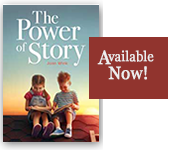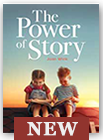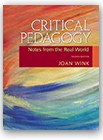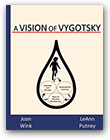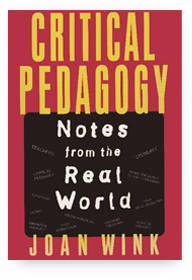Except from:
Wink, J. & Wink D. (2004, pp.104-105) Teaching Passionately: What’s Love Got to Do with It? Boston, MA: Allyn & Bacon.
My People Made It without Bilingual Education
A second story follows in answer to the many times we have been asked a question, which tends to follow this line of inquiry: My people made it without bilingual education. What’s the matter with yours (Betances, Winter, 1986)?
Joan thought a lot about this as she tried to find an answer based on her own life’s experiences.
Yes, my Grandma Grace made it without bilingual education, too. In fact, she made it without any education. Now that I think about it, all my husband’s grandparents and my grandparents made it without bilingual education, and they all made it without education. It didn’t matter in their world.
The men raised cattle, sheep, pigs, and chickens; they planted corn; they dug wells; they panned for gold; they built sod huts. The women took care of children, fed the chickens, planted gardens, cleaned houses, pumped water, canned beef, and fed people. It didn’t matter if they didn’t speak English-the corn still grew; the baby calves were still born; men still needed to eat when they came in from the fields. It only mattered that they worked just as hard as they could for years and years. Schools must have been nearly irrelevant in their worlds.
Those economic avenues are not open to my grandchildren whose educational needs are vastly different from those of my grandparents. Society’s needs are different, too. Today, even if you have a willingness to work and even if you have a strong back, it just isn’t enough.
It seems that the basics aren’t so basic anymore. My Grampy lived from the horse and buggy days to see a man walk on the moon. In my wildest dreams, I cannot imagine what my grandchildren will live to see.
Their world will be totally different from anything we know or used to know. I don’t know what my grandchildren will need to know, but I will guess that they will need high levels of literacy, know how to solve problems, and be able to get along with lots of people who are different from them. They will need to be able to access and to generate new information via technology, that isn’t even in science fiction yet. I suspect that those citizens who will thrive economically and socially in the next century are those who can speak English and other languages. Being bilingual will be basic.
As Joan reflected on her grandparents and her husband’s grandparents, it became clear that the educational needs of the past are not those of the future.
Previous generations gradually learned to talk and understand oral English, and that was enough. Future generations will need complex levels of literacies. Whereas Joan’s grandma only need oral English to thrive in her world, this will not be enough for Joan’s grandchildren.
Conversational English might have served previous generations well, but the future demands academic English (Cummins, 2000b). Drawing on the legacy of many linguists, language educators, and scholars, Cummins’ constructs of conversational and academic language demonstrate the complexity of language proficiency. As a student moves up through the grades, the cognitive demands grow, and the contextual supports diminish, whether it be in written or in oral language. The challenge for schools is to enhance the academic language of students who are in the process of acquiring English. Academic language leads to success.
Yes, English is the goal of bilingual education. More kids are learning English faster than ever before. You can’t stop it. No matter what you do, kids are going to speak English. We, in schools, are taking the credit and/or blame for kids acquiring English, but really they are learning English on the playground, on television, at the mall. Speaking English is good, but it is not good enough. Schools need to focus on literacy and knowledge.
